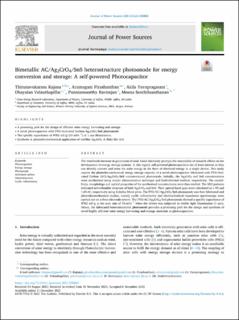Bimetallic AC/Ag2CrO4/SnS heterostructure photoanode for energy conversion and storage: A self-powered Photocapacitor
Kajana, Thirunavukarasu; Pirashanthan, Arumugam; Yuvapragasam, Akila; Velauthapillai, Dhayalan; Ravirajan, Punniamoorthy; Senthilnanthanan, Meena
Peer reviewed, Journal article
Published version

Åpne
Permanent lenke
https://hdl.handle.net/11250/2983406Utgivelsesdato
2021Metadata
Vis full innførselSamlinger
Originalversjon
Kajana, T., Pirashanthan, A., Yuvapragasam, A., Velauthapillai, D., Ravirajan, P., & Senthilnanthanan, M. (2022). Bimetallic AC/Ag2CrO4/SnS heterostructure photoanode for energy conversion and storage: A self-powered Photocapacitor. Journal of Power Sources, 520:230883. 10.1016/j.jpowsour.2021.230883Sammendrag
The worldwide increase in generation of solar based electricity prompts the essentiality of research efforts on the development of energy storage systems. In this regard, self-powered photocapacitors are of keen interest as they can directly convert and store the solar energy in the form of electrical energy in a single device. This study reports the photoelectrochemical energy storage capacity of a novel photocapacitor fabricated with FTO/Activated Carbon (AC)/Ag2CrO4/SnS nanostructured photoanode. Initially, the Ag2CrO4 and SnS nanostructures were synthesized using simple ultrasonication technique and hydrothermal method, respectively. The crystallinity, morphology and optical properties of the synthesized nanostructures were then studied. The XRD patterns indicated orthorhombic structure of both Ag2CrO4 and SnS. Their optical band gaps were calculated as 1.93 and 1.65 eV, respectively using Kubelka-Munk plots. The FTO/AC/Ag2CrO4/SnS photoanode was then fabricated and photoelectrochemical studies, namely cyclic voltammetry and electrochemical impedance spectroscopy were carried out on a three electrode system. The FTO/AC/Ag2CrO4/SnS photoanode showed a specific capacitance of 4782 mF/g at the scan rate of 10 mVs−1 when the device was subjected to visible light illumination (1 sun). Hence, the fabricated heterostructured photoanode provides a promising path for the design and synthesis of novel highly efficient solar energy harvesting and storage materials as photocapacitors.
